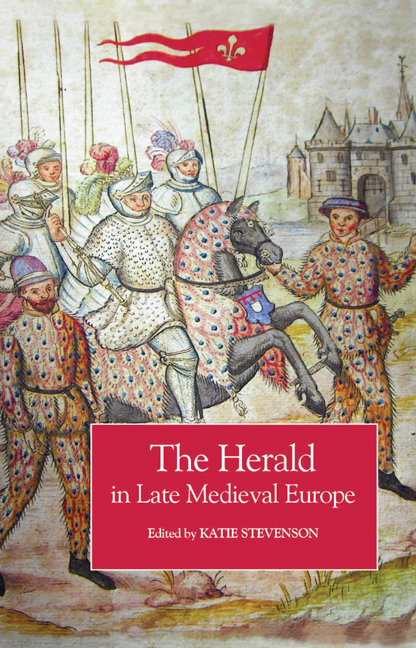Book contents
- Frontmatter
- Contents
- List of Illustrations
- Notes on Contributors
- Acknowledgements
- Abbreviations
- 1 Introduction
- 2 The Development of the Office of Arms in England, c. 1413–1485
- 3 Ancient Precedent or Tudor Fiction? Garter King of Arms and the Pronouncements of Thomas, Duke of Clarence
- 4 Jurisdiction, Authority and Professionalisation: The Officers of Arms of Late Medieval Scotland
- 5 The March of Brittany and its Heralds in the Later Middle Ages
- 6 City Heralds in the Burgundian Low Countries
- 7 King of Arms of the Ruwieren: A Special Function in the German Empire
- 8 Heraldry, Heralds and Politics in the Republic of Florence in the Late Middle Ages
- 9 Tournaments, Heraldry and Heralds in the Kingdom of Poland in the Late Middle Ages
- 10 A time when ‘fools and dwarfs were highly esteemed’? Seeking the Late Medieval Scandinavian Herald
- Index
5 - The March of Brittany and its Heralds in the Later Middle Ages
Published online by Cambridge University Press: 26 October 2017
- Frontmatter
- Contents
- List of Illustrations
- Notes on Contributors
- Acknowledgements
- Abbreviations
- 1 Introduction
- 2 The Development of the Office of Arms in England, c. 1413–1485
- 3 Ancient Precedent or Tudor Fiction? Garter King of Arms and the Pronouncements of Thomas, Duke of Clarence
- 4 Jurisdiction, Authority and Professionalisation: The Officers of Arms of Late Medieval Scotland
- 5 The March of Brittany and its Heralds in the Later Middle Ages
- 6 City Heralds in the Burgundian Low Countries
- 7 King of Arms of the Ruwieren: A Special Function in the German Empire
- 8 Heraldry, Heralds and Politics in the Republic of Florence in the Late Middle Ages
- 9 Tournaments, Heraldry and Heralds in the Kingdom of Poland in the Late Middle Ages
- 10 A time when ‘fools and dwarfs were highly esteemed’? Seeking the Late Medieval Scandinavian Herald
- Index
Summary
WITNESSES AT AN INQUIRY in October 1455 to establish the vast panoply of ‘droits royaux et anciens usages du pais de Bretagne’, which its late medieval dukes claimed to exercise, were unanimous that among these was the right to appoint ‘officiers royaux, scavoir Mareschal, Admiral, Grand-Maistre, Chancellier, President et Roy d'armes’. The origins of most of these posts can be safely pushed back into the fourteenth century and those of marshal and chancellor to the early thirteenth century. That of Grand-Maître de l'hôtel du duc was much more recent, having apparently been created by an ordonnance in 1413, while the first mention of a king of arms occurs a few years later when Bretagne Roi d'armes (Brittany King of Arms) was sent to Henry V of England in Normandy in October 1419. Six months later Bretagne was similarly sent with two esquires to discuss with the lady of Belleville at Montaigu (on the border between Brittany and Poitou) issues arising from the infringement of a truce. Thereafter it is possible to trace a continuous succession of kings of arms in the duchy until well after its incorporation into the kingdom of France by the successive marriages of Duchess Anne to Charles VIII (1491) and Louis XII (1499).
Given the patchy nature of records relating to the ducal household in Brittany in the fourteenth and fifteenth centuries, it is likely that Bretagne had exercised authority as a king of arms for a considerable period before he first appears in our sources. It was probably the same man, or a previous Bretagne, who made the anticlimactic announcement suspending the wager of battle between the dukes of Norfolk and Hereford at Coventry in September 1398, though the writer of the Traison et mort de Richard II simply calls him ‘a herald of the duke of Brittany’. There are, however, other indications that around 1400 heralds were still relatively uncommon at the Breton ducal court, as they were in several other French princely households. Although implied by the existence of individual kings of arms like Bretagne or Malo in the 1420s, a heraldic march of Brittany with a full hierarchy of officers of arms remains difficult to document with any precision for much of the late Middle Ages.
- Type
- Chapter
- Information
- The Herald in Late Medieval Europe , pp. 67 - 96Publisher: Boydell & BrewerPrint publication year: 2009

